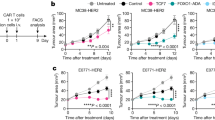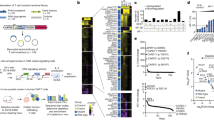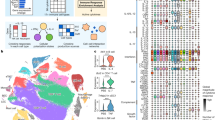Abstract
Raf is a key serine-threonine protein kinase which participates in the transmission of growth, anti-apoptotic and differentiation messages. These signals can be initiated after receptor ligation and are transmitted to members of the MAP kinase cascade that subsequently activate transcription factors controlling gene expression. Raf is a member of a multigene family which includes: Raf-1, A-Raf and B-Raf. The roles that individual Raf kinases play in the regulation of normal and malignant hematopoietic cell growth are not clear. The following studies show that all three Raf kinases are functionally present in certain human hematopoietic cells, and their aberrant expression can result in abrogation of cytokine dependency. Cytokine-dependent TF-1 cells were infected with retroviruses encoding amino-terminal deleted (Δ) A-Raf, B-Raf and Raf-1 proteins. These Raf proteins were conditionally inducible as they were fused to the hormone-binding domain of the estrogen receptor (ER). A hierarchy in the abilities of Raf-containing retroviruses to abrogate cytokine dependency was observed as ΔA-Raf:ER was 20- to 200-fold more efficient than either ΔRaf-1:ER or ΔB-Raf:ER, respectively. This result was unexpected as A-Raf is an intrinsically weaker kinase than either Raf-1 or B-Raf. The activated Raf proteins induced downstream MEK and MAP (ERK1 and ERK2) kinase activities in the cells which proliferated in response to Raf activation. Furthermore, a functional MEK signaling pathway was necessary as treatment of the cells with a MEK1-inhibitor suppressed Raf-mediated proliferation. To determine whether the regulatory phosphorylation residues contained in the modified Raf oncoproteins were necessary for transformation, they were altered by site-directed mutagenesis. Substitution of the regulatory phosphorylation tyrosine residues with phenylalanine in either A-Raf or Raf-1 reduced the capacity of these oncoproteins to abrogate cytokine dependency. In contrast, changing the critical aspartic acid residues of B-Raf to either tyrosine or phenylalanine increased the frequency of estradiol-responsive cells. Thus, the amino acids present in the regulatory residues modulated the capability of Raf proteins to abrogate the cytokine dependency of TF-1 cells. Differences in the levels of Raf and downstream kinase activities were observed between cytokine-dependent and estradiol-responsive ΔRaf:ER-infected cells as estradiol-responsive cells usually expressed more Raf and MEK activity than GM-CSF-dependent, ΔRaf:ER-infected cells. Abrogation of cytokine dependency by the activated ΔRaf:ER proteins was associated with autocrine growth factor synthesis which was sufficient to promote the growth of uninfected TF-1 cells. In summary, these observations indicate that the aberrant expression of certain activated ΔRaf:ER oncoproteins can alter the cytokine dependency of human hematopoietic TF-1 cells. These cells will be useful in evaluating the roles of the individual Raf oncoproteins in signal transduction, cell cycle progression, autocrine transformation, regulation of apoptosis and differentiation. Moreover, these Raf-infected cells may be important in evaluating the efficacy of novel anticancer drugs designed to inhibit Raf and downstream signal transduction molecules.
This is a preview of subscription content, access via your institution
Access options
Subscribe to this journal
Receive 12 print issues and online access
$259.00 per year
only $21.58 per issue
Buy this article
- Purchase on Springer Link
- Instant access to full article PDF
Prices may be subject to local taxes which are calculated during checkout
Similar content being viewed by others
Author information
Authors and Affiliations
Rights and permissions
About this article
Cite this article
McCubrey, J., Steelman, L., Hoyle, P. et al. Differential abilities of activated Raf oncoproteins to abrogate cytokine dependency, prevent apoptosis and induce autocrine growth factor synthesis in human hematopoietic cells. Leukemia 12, 1903–1929 (1998). https://doi.org/10.1038/sj.leu.2401215
Received:
Accepted:
Published:
Issue Date:
DOI: https://doi.org/10.1038/sj.leu.2401215
Keywords
This article is cited by
-
ERK signaling is required for VEGF-A/VEGFR2-induced differentiation of porcine adipose-derived mesenchymal stem cells into endothelial cells
Stem Cell Research & Therapy (2017)
-
Differential localization of A-Raf regulates MST2-mediated apoptosis during epithelial differentiation
Cell Death & Differentiation (2016)
-
Roles of the Ras/Raf/MEK/ERK pathway in leukemia therapy
Leukemia (2011)
-
Multiple forms of PKR present in the nuclei of acute leukemia cells represent an active kinase that is responsive to stress
Leukemia (2011)
-
Role of Ras/Raf/MEK/ERK signaling in physiological hematopoiesis and leukemia development
Immunologic Research (2011)



